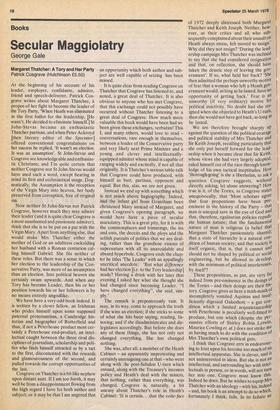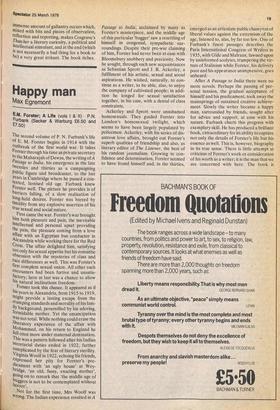Books
Secular Maggiolatry
George Gale
Margaret Thatcher: A Tory and Her Party Patrick Cosgrave (Hutchinson £5.50)
At the beginning of his account of his leader, employer, confidante, admirer, friend and speech-deliverer, Patrick Cosgrave writes about Margaret Thatcher, a propos of her fight to become the leader of the Tory Party, 'When Heath was eliminated in the first ballot for the leadership, IHe wasn't. He decided to eliminate himself.] St John-Stevas became an enthusiastic Thatcher partisan, and when Peter Ackroyd Ithen literary editor of the Spectator] offered conventional congratulations on her success he replied, 'It wasn't an election. It was an assumption'. St John-Stevas and Cosgrave are knowledgeable and enthusiastic Christians; and I'm quite certain that neither Cosgrave nor St John-Stevas would have used such a word, except bearing in mind its first and ecclesiastical usage. Dogmatically, the Assumption is the reception of the Virgin Mary into heaven, her body preserved from corruption, free of original sin. • Now neither St John-Stevas nor Patrick Cosgrave, however much they may admire their leader (and it is quite clear Cosgrave is a most unashamed and passionate admirer), think that she is to be put on a par with the Virgin Mary. Apart from anything else, that would make Mrs Thatcher either the mother of God or an adultress cuckolding her husband with a Roman centurion calling himself Gabriel. She fits neither of these roles. But there was a sense in which her election to the leadership of the Conservative Party, was more of an assumption than an election. Into political heaven she certainly swam upwards. And when any Tory has become Leader, then his or her position towards his or her followers is by no means entirely ungodlike.
We have here a very odd book indeed. It is written by a clever fellow, an Irishman who prides himself upon some supposed paternal protestantism, a Cambridge historian and biographer of Butterfield and thus, if not a Peterhouse product most cer tainly a Peterhouse end-product, an intellectual caught between the three rival dis ciplines of journalism, scholarship and poli tics who finds himself attracted as by a tart to the first, discontented with the rewards and glamourousness of the second, and pulled towards the corrupt opportunities of the last.
Cosgrave on Thatcher is a bit like nephew upon distant aunt. If I am too harsh, it may well be from a disappointment flowing from the high regard I have for both author and subject; or it may be that I am angered that an opportunity which both author and subject are well capable of seizing has been missed.
. It is quite clear from reading Cosgrave on Thatcher that Cosgrave has listened to, and noted, a great deal of Thatcher. It is also obvious to anyone who has met Cosgrave, that this exchange could not possibly have occurred without Thatcher listening to a great deal of Cosgrave. How much more valuable this book would have been had we been given these exchanges, verbatim! This I, and many others, would love to read — conversations, rare enough in themselves, between a leader of the Conservative party and very likely next Prime Minister and a young and clever and intellectuallyequipped admirer whose mind is capable of ranging widely and excitedly, if not all that originally. It is Thatcher's serious table-talk that Cosgrave could have produced, with himself as butt, partisan, opponent and equal. But this, alas, we are not given.
Instead we end up with something which is not much above hagiography. Indeed, had the infant girl from Grantham been christened Mary instead of Margaret, and given Cosgrave's opening paragraph, we would here have a piece of secular mariolatry. This is a great pity, for it is with the commonplaces and trimmings, the ins and outs, the deceits and the ploys and the selfish pursuits of politics that we are dealing, rather than the grandiose visions of supernature with all its unavoidable and absurd hyperbole. Cosgrave ends the chapter he titles 'The Leader' with an appallingly uncritical anecdote: 'But what difference had her election ji.e. to the Tory leadership] made? Having a drink with her later that evening I asked her what she thought she had changed since becoming Leader. "1 have changed everything", she said, sim
ply.'
The remark is preposterously vain. It may, in its way, come to approach the truth if she wins an election; if she sticks to some of what she has been saying, reading, listening; and if she disadministrates and dislegislates accordingly. But before she does any of these things, she has not only not changed everything. She has changed nothing.
She was, after all, a member of the Heath Cabinet — an apparently unprotesting and certainly unresigning one at that —who went along with he post-Selsdon U-turn which ensued, along with the Treasury's incomes policy and Heath's deal with the miners, that nothing, rather than everything, was changed. Cosgrave is, naturally, a bit uneasy about Thatcher's role in Heath's Cabinet: 'It is certain. . .that the volte-face of 1972 deeply distressed both Margaret Thatcher and Keith Joseph. Neither, how ever, as their critics and all who subsequently complained about their assault on, Heath always stress, felt moved to resign. Why did they not resign? 'During the leadership campaign Mrs Thatcher was inclined
to say that she had considered resignation and that, on reflection, she should have taken the drastic step of leaving the gov
ernment'. If so, what held her back? 'She then admitted the perhaps unworthy motive of fear that a woman who left a Heath government would, as long as he lasted, have no opportunity of getting back.' Fear is an unworthy (if very ordinary) motive for political inactivity. No doubt had she resigned when she objected to Heath's U-turn, then she would not have got back, so long as he lasted.
We are therefore brought sharply uP against the question of the political courage and political stability of Mrs Thatcher and Sir Keith Joseph, recalling particularly that she only put herself forward for the leadership when it became clear that Sir Keith, whose views she had very largely adopted, ruled himself out of the race through knoWledge of his own tactical ineptitudes. HOW `thorough-going' is she a libertarian, to ask a question Cosgrave suggests, without directly asking, let alone answering? HOW true is it, of the Tories, as Cosgrave states unequivocally, that 'Most scholars agree that four propostions have been preeminent in the history of the Party — that man is unequal save in the eye of God and that, therefore, egalitarian policies repudiate human nature; that the fundamental nature of man is religious (a belief that Margaret Thatcher passionately shares); that a state of hierarchy is a natural condition of human society; and that society is itself organic, that is, that it cannot and should not be shaped by political or social engineering, but be allowed to develoP, with the minimum of political interference, by itself'? These propositions, as put, are very far indeed from pre-eminence in the doings of the Tories — and their doings are their his' tory. Cosgrave gives us here a mish-mash of incompletely vomited Aquinas and inst.& ficiently digested Oakeshott — a gat condition which a limited acquaintanceshiP with Peterhouse is peculiarly well-fitted to produce, but one which (despite the Pa" suasive efforts of Shirley Robin Lewin' Maurice Cowling et. al.) does not strike me as having much to do with the condition of Mrs Thatcher's own political guts.
I think that Cosgrave errs in endeavour' ing to foist upon his heroine too much of an intellectual apparatus. She is clever, and is not uninterested in ideas. But she is not an intellectual, and surrounding her with intellectuals in person, or in words, will not turn her into one. Cosgrave must know this. Indeed he does. But he wishes to equip Mrs Thatcher with an ideology —with his, indeed — and, his book is an attempt to do so which, fortunately I think, fails. In its failure an
immense amount of gallantry occurs which, mixed with bits and pieces of observation, reflection and reporting, makes Cosgrave's Thatcher a literary curiosity, a political and intellectual stimulant, and at the end (which IS not necessarily a bad thing for a book to be) a very great irritant. The book itches.



































 Previous page
Previous page